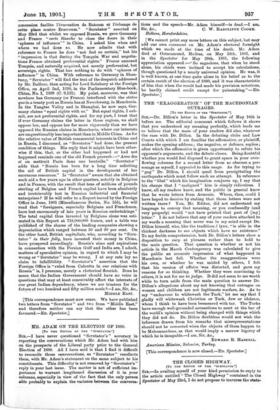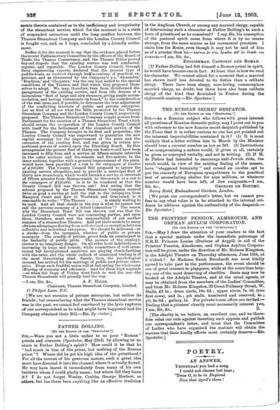THE CLOSED HIGHWAY. [TO TUB EDITOR OF THY "SpecrATos."1 SIR,—In
availing myself of your kind permission to reply to the article entitled " The Closed Highway " contained in the Spectator of May 23rd, I do not propose to traverse the state- manta therein contained as to the inefficiency and irregularity of the steamboat service, which for the moment is in a state of suspended animation until the long conflict between the Thames Steamboat Company and the London County Council is fought out, and, as I hope, concluded by a friendly settle- ment.
Suffice it for the moment to say that the evidence placed before the recent Parliamentary Committee by the officers of the Board of Trade, the Thames Conservancy, and the Thames Police proved beyond dispute that the existing service was well conducted, regular, and reputable. The London County Council, through their engineering experts, declared that the present type of paddle-boats, as evolved through hall-a-century of practical ex- perience, and as illustrated by the Company's p.s. Alexandra,' Boadicea,' and Cleopatra,' was the one best suited to the special conditions of the Thames, and that which they proposed them- selves to adopt. We may, therefore, turn from ill-informed dis- paragement of the existing service, and from idle dreams of a miraculous " fleet of large and airy steamers, giving ample accom- modation, and having restaurants on board," to the consideration of the real issue, and, if possible, to determine the true adjustment of the conflicting interests of public and private enterprise. Let us first of all see what the Bills promoted by the Thames Steamboat Company and the London County Council respectively proposed. The Thames Steamboat Company sought powers from Parliament for the creation of a Thames Steamboat Trust which should secure the co-operation of the London County Council with itself for the betterment of the steamboat service of the Thames. The Company brought in its fleet and properties ; the London County Council was empowered to guarantee the new capital necessary for the improvement of the piers and the extension of the existing fleet, and was given in return pro- portional powers of control upon the Directing Board. By this arrangement the present fleet of thirty-six boats would have been increased to fifty-four, and a service at fifteen-minute intervals in the outer sections and ten-minute and five-minute in the inner sections, together with a general improvement of the piers, would have been provided at a risk to the ratepayers of London of £160,000. The County Council Bill proposed to ignore the existing service altogether, and to provide a municipal fleet of thirty new steamboats, which would furnish a service at intervals of fifteen minutes from Hammersmith to Greenwich at a risk to the ratepayers of £320,000. Is it to be wondered at that the County Council Bill was thrown out ? And seeing that the scheme proposed by the Thames Steamboat Company secured twice as good a service at half the risk to the ratepayers, from Hampton Court and Kew to Woolwich and Gravesend, is it reasonable to write: "The Thames is simply waiting to be used. And all that stands in the way is what we cannot but call the perverse economy of a Select Committee " ? The reason why the Steamboat Trust Bill was thrown out was that the London County Council were not concurring parties, and upon them, therefore, must rest the responsibility of yet another summer of a steamerless Thames. And yet there seem to be many obvious advantages flowing from well-devised co-operation between collective and individual enterprise. We should be delivered—at a stroke—from the tyrannies, whether of public or private monopoly. The cruelty of private greed finds its counterpart in the barbarity of public pride. The menace of the employe- elector is no imaginary danger. On all sides local indebtedness is increasing by leaps and bounds, while committees of well-inten- tioned but inexperienced amateurs are playing chuck-farthing with the rates, and the whole outlook of municipal trading is of the most threatening kind. Surely, then, the psychological moment has arrived for the marriage of public and private enter- prise. From such fruitful union will at last spring the wholesome offspring of economy and efficiency. And for these high nuptials —as when the Doge of Venice went forth to wed the sea—the Thames Steamboats will proudly lead the way.
Chairman, Thames Steamboat Company, Limited. 17 Philpot Lane, E.C.
[We are not enemies of private enterprise, but rather its friends ; but remembering what the Thames steamboat service was in the past, we cannot feel convinced by the lyric raptures of our correspondent as to what might have happened had his Company obtained their Bill.—ED. Spectator.]











































 Previous page
Previous page